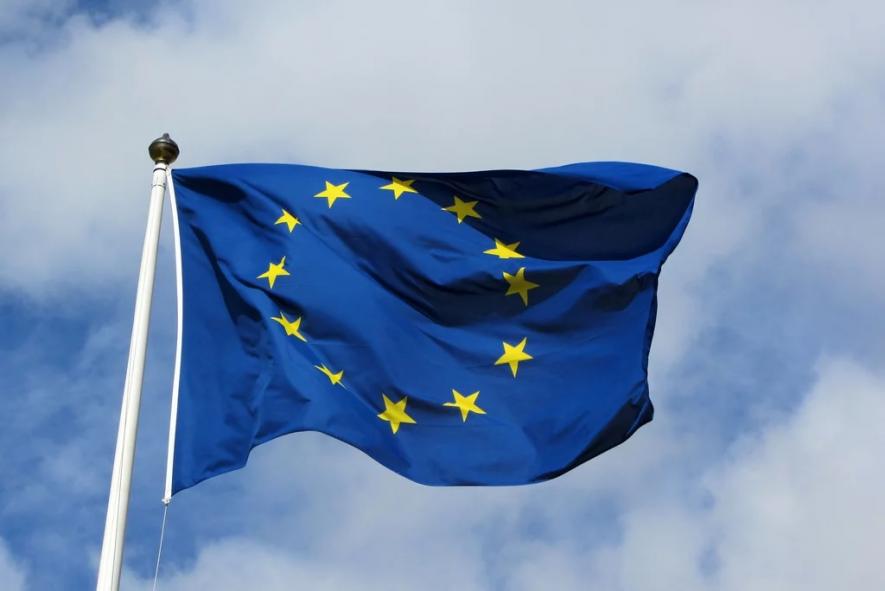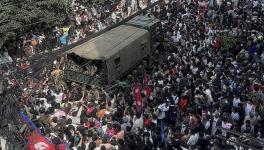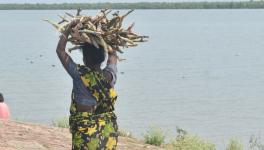EU Leaders Debate Ways to Strengthen Crackdown on Migrants Fleeing Conflict Zones

The harsh crackdown on migrants has led to a 95% decline in irregular border crossings into the European Union over the last three-and-a-half years. Meanwhile, the death toll among those attempting to cross the borders while fleeing from war and violence is on the rise. None of this stopped EU leaders from discussing proposals to further tighten the noose on refugees, over an “informal working dinner” last week at Salzburg, Austria.
A key proposal was increasing the strength and scope of Frontex – the European Border and Coast Guard Agency headquartered in Warsaw, Poland. Another was outsourcing the task of restraining migrants to Egypt and other north African states, including Tunisia and Morocco. The systematic human rights abuses in many countries during this process has largely remained under the media’s radar.
The proposal to expand Frontex met with strong resistance from many member states who are wary of supposed EU threats to their national sovereignty. But there was a broad consensus on outsourcing the crackdown on migrants.
With a six-fold increase in budget allocation, the Frontex, as per the EU Commission’s proposal, will be allotted 11 billion euros for the period from 2021 to 2027. This includes an increase in staff from the current 1,300 (with a reserve of 1,500 border guards loaned from the EU members) to 10,000 by the year 2020.
The commission has demanded compulsory contributions from member states for the force. However, it remains to be seen if countries whose economies are under pressure due to austerity policies imposed by the EU will do so. Many of these countries have also seen the highest influx of refugees. Italian prime minister Giuseppe Conte, for instance, questioned the “usefulness of that investment”. He also cited concerns about national sovereignty arising from this 10,000-strong armed force operating on Italy’s borders along with its coast guard.
Backing Conte, Slovakian prime minister Peter Pellegrini said, “It is not right to have an Italian coast guard and, parallel to that, to build some small army under the Frontex label.” Czech prime minister Andrej Babis said, “Malta, Italy, Greece, Spain need to be told that they will get more money. They each have their own coast guard, they don’t need any Frontex.”
Though neither Slovakia nor the Czech Republic has access to the sea, the mandate of Frontex includes operations along the land borders as well.
“They will send mercenaries here from Brussels, from where they will be told how the Hungarian border should be protected,” the rabidly anti-immigrant Hungarian Prime Minister Viktor Orban had said days before the summit. “If they control Hungarian border defences, they will let in migrants,” he added, accusing the EU of having a “pro-immigration” plan. This plan supposedly involves taking border control from the member-states in the peripheries, and throwing the gates open to migrants. Orban’s statements come despite the harsh measures already implemented by the EU.
When attempts to address these concerns failed, French president Emmanuel Macron, a prominent supporter of Frontex, lashed out “Countries that do not want more Frontex or solidarity will come out of Schengen, countries that do not want more Europe, they will get out of the structural funds,” he said, adding, “Europe is not a menu à la carte, it’s a political project.”
German Chancellor Angela Merkel, another key supporter of the project, however, maintained a low profile. Just a few months ago, her government was in peril after her coalition partner, the Christian Social Union, and its leader, interior minister Horst Seehofer, threatened to leave the government, citing her inaction to stop migrant flow into the country.
A number of editorials in Hungary have generated a narrative that there are two distinct camps within the EU. One is allegedly engaged in the project of creation of a federal Europe, with increasing compromises on national sovereignty of member states; the other, a eurosceptic “nationalist” camp, defends conservative values and opposes migration and intervention from Brussels. This clash between the two camps is expected to play out in the European Parliament elections next year.
Many of the critics of Frontex were for spending more to outsource the crackdown on migrants. Conte said, “I’d prefer these investments to be destined for Africa.”
The EU now intends to expand the number of countries to which it will outsource the task of keeping refugees away. This is drawing on its success in financing Turkey and Libya to stop migrants, often through brutal means.
At Salzburg, European Council president Donald Tusk mooted the idea of a EU-League of Arab States summit in Egypt in February. Urging EU member-states to stop quarrelling with each other, Tusk said, “Despite the aggressive rhetoric, things are moving in the right direction, mostly because we have been focused on external border control and cooperation with third countries, which have brought down the number of irregular migrants from almost 2 million in 2015 to fewer than 100,000 this year.”
This decline, however, has come at a high cost as far as migrants are concerned. For instance, Turkey summarily pushed back into Syria” those who were fleeing from the war-torn country in exchange for 3 billion euros from the EU in 2015. In the previous EU summit in July, the European Commission agreed to provide an additional 3 billion euros to Turkey for building a “Facility for Refugees”. Turkey was also commended by Merkel for “doing a tremendous job” in reducing the migrant flow through the eastern Mediterranean route by 97%
The EU is bound by the Charter of Fundamental Rights of the European Union, Article 19(2) of which states that “No one may be removed, expelled or extradited to a State where there is a serious risk that he or she would be subjected to the death penalty, torture or other inhuman or degrading treatment or punishment.” However, by outsourcing the job to Turkey, the EU has been able to find a loophole.
Turkish security forces have shot many asylum seekers who were attempting to sneak across the border. This is in line with its 2016 commitment to the EU that it would “take any necessary measures to prevent new sea or land routes for illegal migration opening from Turkey to the EU.”
In return, the EU countries have been asked to turn a blind eye to human rights and freedom of speech violations in Turkey. “We can say that EU and the European institutions have outstanding issues with Turkey on human rights, press freedoms and so on.. We can harp on about that but where is that going to take us in our discussions with Turkey?”, the president of the EU asked the European Parliament in 2016, adding, “We need to involve Turkey in our initiatives. We want to ensure that no more refugees come from Turkey into the European Union.”
Another successful agreement was with Libya, which has been assured 237 million euros by the EU. As per an agreement signed with the country last year, the EU agreed to “step up its support” for the Libyan coast guard, which was tasked with choking the migrant flow through the central Mediterranean route. This is predominantly used by those fleeing conflicts in sub-Saharan and North Africa.
“Libyan Coast Guards or Navy intercepted boats and returned the migrants and refugees back to land and into detention centers, often subjecting the migrants they intercepted to physical and verbal abuse.. Officials and militias held migrants and refugees in prolonged detention without judicial review and subjected them to poor conditions, including overcrowding and insufficient food. Guards and militia members subjected migrants and refugees to beatings, forced labour, and sexual violence,” according to a 2017 report by Human Rights Watch.
“Support for the Libyan Coast Guard.. including the establishment of a Libyan search and rescue region, has also resulted in increased numbers of people… returned to Libya. Once in Libya, they are detained with no possibility of release by UNHCR except for the purpose of evacuation to a third country,” stated a UNHCR report released earlier this month.
The region has been also declared off-limits for vessels operated by NGOs which used to be involved in rescue operations. Thus, the death rate has increased despite fewer people attempting this crossing.
But for the EU, the agreement was indeed a success. Between August 2017 and July 2018, the number of migrants arriving from Libya declined by 82%, from 172,000 to 30,800.
However, even these sharp declines have not satisfied EU leaders who continue to insist on more strong action, which is likely to cause even more suffering to those struggling to escape from conflict zones.
Get the latest reports & analysis with people's perspective on Protests, movements & deep analytical videos, discussions of the current affairs in your Telegram app. Subscribe to NewsClick's Telegram channel & get Real-Time updates on stories, as they get published on our website.
























